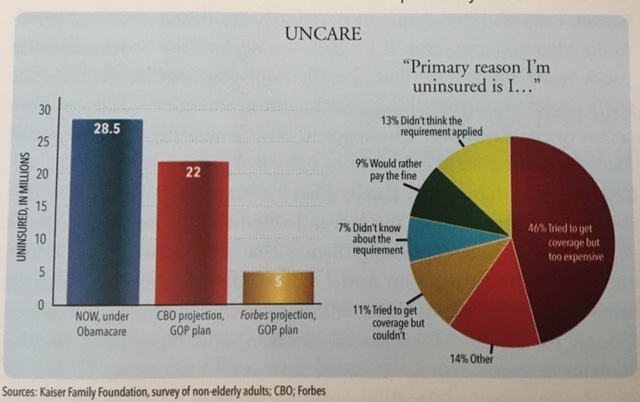from The Wall Street Journal,
6/22/17:
The draft bill contains many conservative victories, which is why the left hates it.

Senate Republicans released their draft bill to repeal and replace ObamaCare on Thursday, and Majority Leader Mitch McConnell is hoping for a vote next week. The binary choice now is between pushing past the media and Democratic flak to pass a historic achievement, or wilting under the pressure and ratifying the ObamaCare status quo.
The bill is an imperfect compromise between moderate and conservative Republicans, and it makes pains to accommodate different interests and the Americans, states and businesses that have adapted to ObamaCare over the years. The center-right nature of the details means the Senate won’t be ushering in some free-market utopia. But the reform is a major improvement over the U.S. health-care status quo that will worsen if the bill fails.
***
The Senate bill works off the American Health Care Act that the House passed in May. Like the House, the legislation replaces ObamaCare’s subsidies with tax credits for people who buy insurance on the individual market, ends Medicaid’s status as an open-ended entitlement, and starts to resolve some of the health-care system’s abiding flaws.
Medicaid was most divisive for Republicans in their months-long internal debate, so the pleasant surprise is that the Senate’s entitlement overhaul is somewhat stronger than the House’s. The program originally meant for poor women, children and the disabled—which ObamaCare opened to able-bodied, working-age adults above the poverty level—would be modernized for the first time. This could become the most consequential social reform since the welfare reconstruction of 1996.
Like the House, the Senate would end the funding formula that rewards states for spending more and transition to block grants, allocated on per capita enrollment. Governors would receive far more regulatory flexibility to manage their programs. Under the final House bill, the grants would max out at the rate of inflation plus one percentage point, starting in 2020.
The Senate waits four years instead of three but pegs the grants to inflation with no adjuster. The danger of delay is that grants become another phony rule like the old Medicare “doc fix” that Congress refused to enforce. But the Senate’s structural changes are more ambitious, and the benefits of those revisions will compound over time.
The Senate also ends ObamaCare’s discrimination between old and new enrollees, which liberals caricature as “rolling back” the Medicaid expansion. The government now pays the whole cost for the expansion population, to encourage Governors to join, but states are only compensated at a national-average 52% match rate for traditional beneficiaries like poor kids. Funding everyone equally—starting in 2021—will cause Governors to find efficiencies and retarget care to the most vulnerable.
As for the failing ObamaCare insurance exchanges—Anthem quit Wisconsin and Indiana on Wednesday—the Senate would provide tax credits for use in a somewhat deregulated individual market. Rather than mandates to force Americans to buy coverage, which don’t work in any case, the bill uses incentives to lure consumers and insurers back with patient-centered coverage that is more affordable and better meets individual needs.
The opportunity is to show that center-right solutions can get better results than government in the form of lower premiums and more coverage options. The Senate includes about $100 billion for a “stability fund” that would start to contain ObamaCare’s damage and could be used by creative Governors to support insurance markets, as states like Maine and Alaska have recently demonstrated.
Importantly, the Senate bill also repeals all of ObamaCare’s tax hikes, including the industry taxes that are passed on to consumers and the 3.8-percentage-point surtax on investment income. Some Senators pushed to keep the surtax to avoid the tax-cuts-for-the-rich label and spend the revenue on something else, but the payoff in economic growth and rising incomes outweighs the temporary political hit.
Republicans have campaigned across four elections against ObamaCare, and now Americans will see if they have the courage of their professed convictions.
Four conservative Senators said Thursday they oppose the draft in its current form, enough to kill it. They say they’re open to negotiation, but Majority Leader McConnell’s goal over many weeks of talks has been to produce a bill that can get 50 votes. Perhaps Mike Lee, Ted Cruz, Rand Paul and Ron Johnson are merely trying to coax one or two policy changes during debate, but a final “no” really would be a vote to live with ObamaCare.
Failure would expose Republicans as feckless, with conservatives attacking the GOP for having failed and Democrats attacking the GOP for having tried.
The Senate bill is imperfect, but it includes many conservative policy victories that have long been Republican goals. It’s not too much to say this is a defining moment for whether the GOP can ever reform runaway entitlements. If Republicans fail, the next stop is single payer.
More From The Wall Street Journal (subscription required):















